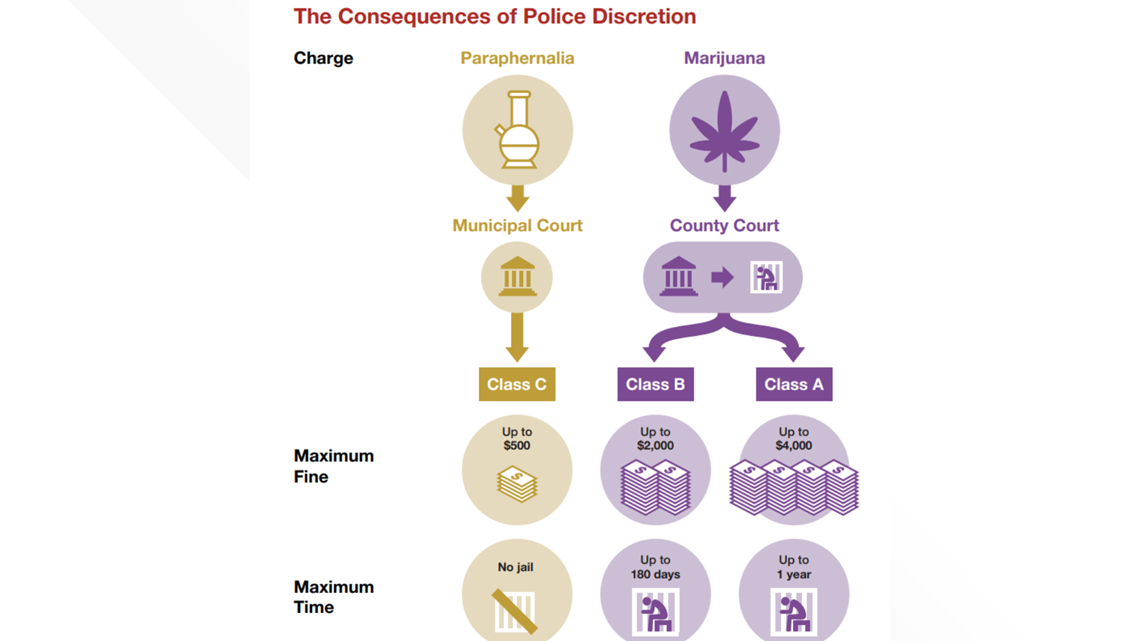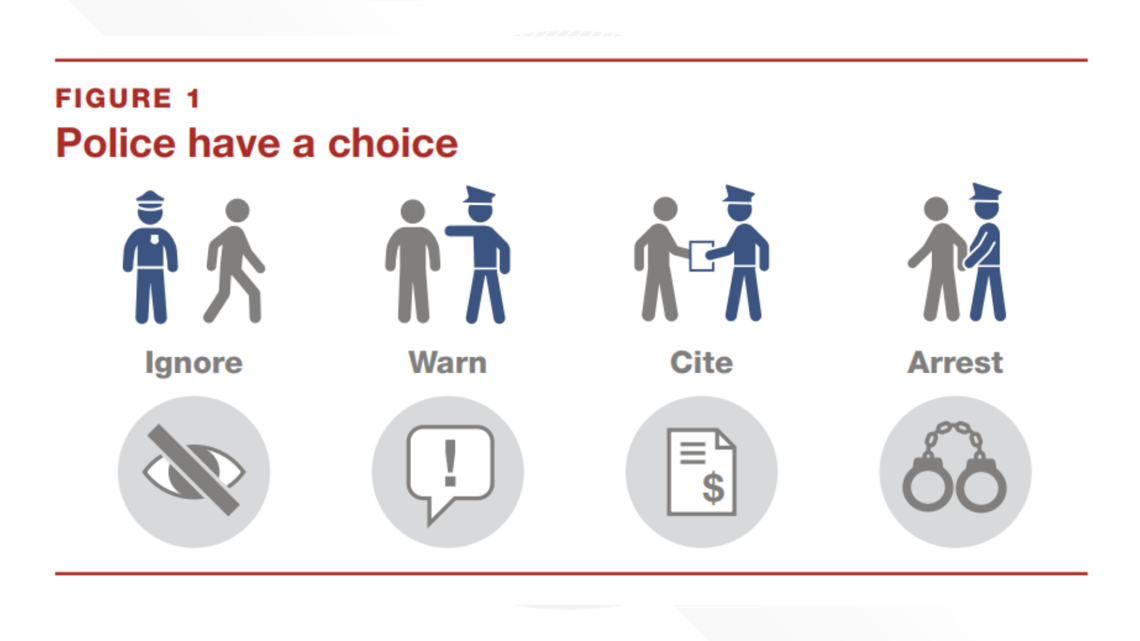DALLAS COUNTY, Texas —
Who is getting tickets and who is being arrested for small amounts of marijuana in Dallas County? A study released this month from the Southern Methodist University showed that Black people were overrepresented among people cited, arrested, prosecuted, or referred for prosecution in 2018.
The study looked at misdemeanor marijuana cases in six cities in the county and looked at which cases were referred to the Dallas County District Attorney's Office in 2018 for prosecution for misdemeanor possession of drug paraphernalia and marijuana.
Marijuana use is roughly equal in the Black and white populations, the report said.
"What we saw instead was at every, level Black people were overrepresented in comparison to their presence in the general population," said Pam Metzger with SMU, who led the study.
For example, in the city of Dallas, Black people were 2.48 times more likely to be prosecuted for class C misdemeanors and 5.54 times more likely to be referred for Class A or B prosecution compared to people who are not Black, the study said.
Black people makeup 10% of the population in Richardson but account for 45% of the people prosecuted or possession of drug paraphernalia.
“These data underscore the urgent need for a new approach to low-level drug offenses,” the study said.
The study, conducted by SMU's Deason Criminal Justice Reform Center, examined the impact of Creuzot's policy of declining to prosecute most misdemeanor cases of first-time marijuana possession in the county. Creuzot was elected in 2018.
"The numbers speak to the complaints from the community, and that is that people of color are being targeted by the police departments, at least some that we know, for low-level marijuana enforcement and arrest," Creuzot claimed.
A study released in March from the Dallas Office of Community Police Oversight also said that Black people were overrepresented in arrests for possession of 2 ounces of marijuana.
Enforcing misdemeanor drug laws
The report says that when enforcing misdemeanor drug laws, police in Dallas County can issue a citation rather than arresting that person and booking them in jail. However, in 2018, police in Dallas County rarely used this “cite-and-release” option for misdemeanor marijuana possession, the report said.
The report looked at the racial disproportionality in the cities of Dallas, Garland, Grand Prairie, Irving, Mesquite and Richardson.
“The report concludes that, as compared to their representation in each city’s population, Black people were grossly overrepresented among those who were accused of low-level drug offenses,” the report said.
In March, Dallas Police Chief Eddie Garcia announced that the department won’t arrest a person for possession of fewer than 2 ounces of marijuana unless a more serious infraction is involved.
Some larger police departments in North Texas have changed their policies to either give a citation for possession of marijuana when it is less than a certain amount or give a lesser charge.
The departments are changing the way they handle low-level marijuana charges either because of the impact of the COVID-19 pandemic, to free up officers to focus on violent crime, or because of the testing element with the legalization of CBD.
The SMU study only looked at 2018 data. That's because in 2019, a Texas law was passed to legalize hemp that has less than 0.3% of THC, the psychoactive ingredient in marijuana. Tests have to show whether the substance has more than 0.3% THC when filing charges.
Police are also free to “down charge” the incident as a paraphernalia offense, even if the evidence supports a charge of marijuana possession.


Possession of drug paraphernalia is a Class C misdemeanor, punishable by a fine, and it goes to municipal courts. But, if a person is charged with possession of marijuana, then that’s a Class A or B misdemeanor, which goes to the county courts and can lead to jail time.
Class A misdemeanor (between 2 to 4 ounces of marijuana):
- County courts
- Punishable by up to one year in jail
- Fine of up to $4,000
Class B misdemeanor (less than 2 ounces of marijuana):
- County courts
- Punishable by up to 180 days in jail
- Fine of up to $2,000
Class C misdemeanor (possession of drug paraphernalia)
- Municipal courts
- Punishable only by a fine
Marijuana cases must be referred to the Dallas County District Attorney’s Office. If the District Attorney accepts a case for prosecution, that case must be resolved in one of Dallas’ county courts.


Data showed that Black people were overrepresented in defendants charged with a Class C possession of drug paraphernalia.
WFAA asked the police departments named in the study for comment, but most said they hadn’t thoroughly reviewed the study and had no comment. But Grand Prairie police criticized the study, saying the data was mispresented.
Here is the full statement from Grand Prairie Police Chief Daniel Scesney:
“Unfortunately, the Grand Prairie Police Department was not asked for data from the Dedman School, and I am unfamiliar with the referenced 'Stats and Stories' research methodology. I did, however, find the presentation of the data inaccurate. A significant number of those who received a Grand Prairie marijuana case did not live in our city, yet the authors compared ALL Grand Prairie marijuana cases to Grand Prairie resident demographics. Had the authors compared Grand Prairie resident marijuana cases to Grand Prairie resident demographics, they would have found African Americans represented 23.6% of the marijuana cases, almost an exact match to our 23% African American population.
Additionally, the authors’ highlighted their goal of determining the effectiveness of Judge Cruezot’s policy on non-prosecution of marijuana cases by comparing race demographics of those arrested to help illustrate this point. Unfortunately, the authors did not control for defendants who had additional charges to more accurately determine effectiveness. In our case, the majority of defendants had additional charges including Evading Arrest in a Vehicle, Unlawfully Carrying a Weapon, Criminal Mischief, and outstanding arrest warrants. In other words, many of these defendants would have been arrested regardless of the Judge’s policy and further underscores the officer's proper use of discretion.
While I am always open to good faith recommendations to improve our profession, solutions begin with a factual representation of the data. This is critical for the residents of Grand Prairie, the men and women who protect it, and our entire commUNITY regardless of city.”
Creuzot responded to the statement, saying: “The point is not that they’re stopping people who live in other cities. The point is they’re stopping people of color and enforcing traffic laws that they wouldn’t do for white people."
Reducing racial disparity in marijuana prosecutions was among Creuzot’s earliest priorities. Creuzot and the researchers at SMU said that throwing people in jail for small amounts of pot can have a long-lasting impact on some people’s lives.
"What we see is, it traps many people in a cycle of poverty over and repeatedly, where they get behind on fines and fees. They can’t pay back the tickets, they lose their licenses,” Metzger said.
SMU plans to make a follow-up study on how enforcement of drug paraphernalia and marijuana possession laws changed during Creuzot's first year in office.
Editor's note: Updated to clarify that John Cruezot took office as the Dallas County district attorney in 2019 after the period that was researched for the study. Updated to clarify that the Grand Prairie Police statement was made by Chief Scesney.



